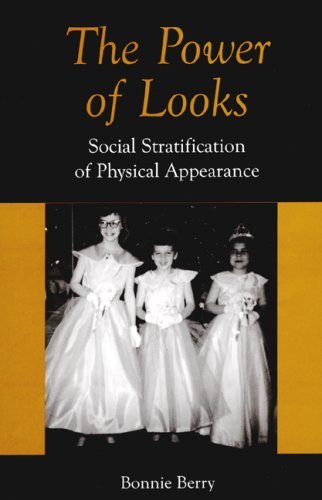Book review of The Power of Looks. Social Stratification of Physical Appearance by Bonnie Berry, Ashgate 2008
By Tereza Kuldova
Antropologi
“When we consider the disparity in what we spend our money on, we find the depressing fact that, in the US, more money is spent on beauty than on education or social services. This fact shows the vacuousness of our society, but also may explain why we persist in the mainly pointless behaviors of buying beautifying products and services. If we are not educated, we may believe that physical appearance is more important than being learned, and we may rely on looks to accrue power instead of using our brains” (p.69).

The book The Power of Looks deals with one of those topics that impact all of us in our everyday lives every single day, one way or another. Namely our prejudices and conceptions of beauty and attractiveness and the ways in which we act on those and discriminate people based on their looks.
Bonnie Berry calls this phenomenon ‘lookism’, which is one of the many ‘isms’ we have to deal with in our world, such as racism, or colorism.
The book shows very clearly how the bias towards attractiveness and beauty creates profound social inequalities and determines our access to both social and economic power. It is not news that people who ‘look better’ have better chances to succeed, get jobs, pass oral exams and so forth. In the same way in which beautiful people are positively ‘discriminated’, those not beautiful enough are negatively discriminated.
This appearance bias, the beauty ideal created and supported and perpetuated by the media, advertising and cosmetic and pharmaceutical companies, creates a feeling in ourselves, a feeling of ‘not being good enough’, the result is anxiety (p. 57). We tend to constantly fix ourselves, be it through make up, clothes, plastic surgery, liposuction, teeth whitening (and more), in order to be perceived as ‘acceptable’ or ‘normal’, if not beautiful. Being perceived as ‘ugly’ or different often leads to social exclusion, isolation, economic, social and romantic discrimination as well as lack of access to social and economic power.
What distinguished The Power of Looks from other popular books on this topic, such as the Beauty Myth by Naomi Wolf or Beauty Junkies by Alex Kuczynski, is that it has a distinctively sociological take on the topic. This is a great advantage over the book Bonnie Berry published earlier, Beauty Bias, which was much more ‘popular’ and part of the same discursive realm as the books mentioned above. The Power of Looks has even two chapters on theory, method and possible approaches to the problem of social stratification based on our looks and to what she calls ‘social aesthetics’, from functionalism to symbolic interactionism. It is no doubt that this book can serve as a great introduction into the topic for students of sociology and anthropology.
For greater awareness about lookism
The most important aspect of this book in my view is however not its originality or its bravado of writing, but it is its message and the aim to build awareness about social stratification and discrimination based on looks. This is a message of acute importance in our world that is too often driven by media images of what is beauty and what it means to be beautiful, messages that fuel our continual sense of inadequacy and force us to recreate ourselves according to these images through consumption of products that often do very little to improve our looks. In the worst cases, these images, ideals and messages drive us under the scalpel where many have died. (See for instance this ABC news story Mother’s Death Highlights Dangers of Plastic Surgery).
The book is important in its focus on and analysis of these phenomena. And since it adopts a sociological approach, it not only builds our awareness about appearance bias and the way it shapes hierarchies and inequality, but it also gives us a conceptual apparatus to grasp these phenomena, to be able to conceptualize them, pinpoint them and talk about them. This is what I consider the greatest contribution of the book. And in line with the message of the book, I wish to draw your attention, in this review, to certain issues that the book raises and that I feel are interesting to think through and reflect about.
The topic of discrimination based on skin color is going through the whole book and it is interesting to think in this respect of the work of Nina Jablonski – Skin: A Natural History, which is a more evolutionary take on the topic of skin, yet definitely interesting – particularly the fact that from a biological perspective, white skin which is considered socially superior is in fact biologically inferior, in that it is easily prone to cancer and other environmentally caused damage.
To Read the Rest of the Essay and To Access Videos/Hyperlinked Resources
No comments:
Post a Comment